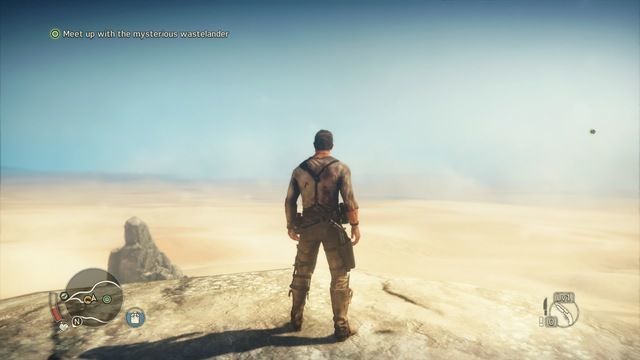
Mad Max: Fury Road made an impeccable push to headline women in traditionally male-dominated action cinema. Mad Max - a video game adaptation with little connection except in name - puts chains around the female character's necks, uses women as prizes, and then seals them in cages. Partway through, a female bit character pleads, “Please don't slay us. We have no value.” Subtle.
Cars and violence are a religion to Mad Max although in the simplest interpretations. Video games remain an immature medium, gloriously fun if still repressed by their obsession with weakly contextualized violence. Max is an insufferably tired and now typical content hive, teasing allegories before it is decided that content must rule over all. Tear down a tower, raid a base, punch people, explode things, then wonder how any of this ties into a cohesive narrative.
... DLC is ad-supported, because surely the empty, desolate deserts and maggot food of Mad Max necessitates a sip from the corporate sponsorship of Rockstar energy drinks.
Mad Max is the perfect illustration of the modern video game. It exists because a demographic of 18 to 34 year old males will enjoy playing as other males, violent ones at least. Women in chains; most of the demo will like that too. Those targeted players can then be exploited through marketing, so load screens pander DLC. This DLC is ad-supported, because surely the empty, desolate deserts and maggot food of Mad Max necessitates a sip from the corporate sponsorship of Rockstar energy drinks. Then again, maybe Rockstar is what denizens of Mad Max use for fuel.
Here's a story, about a car named Opus
If there's a story, it's about a car, Max's specficially – Magnum Opus. Pieces of scrap are looted and Magnum Opus levels up to challenge the finale. Oddly, so does Max. Why metal scrap is exchanged to teach him a shoulder charge is unclear. Max himself is hardly mad either. He neither carries the performance oomph of Mel Gibson's Max or the quiet, raw survival instinct of Tom Hardy's. This Max is just tired, a cypher for exposition and a means to complete checklists.
For a video game about a car – and a world about cars, where exhausts spit flame and engines rumble – there is an awful dearth of them. Time is spent generally locked in melee scuffles, deciphering weary patterns of conveniently color-coded, apocalypse-made War Boys. Max is safely contained in a combat system familiar to Batman. Triangle to parry will soon be as much a muscle memory as X is to jump. He punches, he stabs, he wails on kidneys hundreds (or thousands, really) of repetitious times until the violence no longer has any stay, as if it could after the first hour.
Beauty in violence
Shame this is all that fills an aesthetically sound and routinely gorgeous world. Opening in a dried sea – where bases are made of ships once rotting on an ocean floor and shelter is a sand-sunk shipping container – is intelligent. It mirrors Fury Road. Teach and develop visually; say nothing. This scenario uses the freedom of publisher Warner's dollars to showcase the medium's storytelling and world building as it should be. Plus, the dense contrast of pale salt-laden sand and blue skies show a powerful sense of color purpose. What designers fill this all with though is disjointed, scattered, and abbreviated flurries of gameplay.
Fury Road was cinema at its purest visual form. There was necessity and merit and reason to each shot. Everything was important. Editing discipline proved remarkable. This skill has yet to be learned on the interactive side. Bloat is easier. Looking further back, Mad Max's theatrical origins can inspire film studies. That pre-apocalypse represented inevitability, reflected the '70s oil crisis, and expressed frustration with rising Australian crime rates.
The mainstream video game sort-of adaption exists to subdue forum posts from those who quantify their purchase merely by numbers - those of time and content. That's why linear video games are dead or dying and with them, so are the inroads to narrative innovation. Now games are so lost, selling energy drinks in the apocalypse isn't a funny faux pas; it's a depressing expectation. No one will study this for anything other than its redundancies.
Pointlessly drive there, find this thing, drive again to bring it back. How this became tolerable in an industry known for its addiction to instant gratification is nigh unbelievable.
Games have become plaid, where an array of crossing colors are represented by a disorganized collection of maps, icons, and side missions – the latter of which are often arbitrarily demanded to pursue the core story in Mad Max. That's egregious and unforgivable. Pointlessly drive there, find this MacGuffin, drive again to bring it back. How this became tolerable in an industry known for its addiction to instant gratification is nigh unbelievable. Quick travel was created to alleviate the problem - Mad Max has it too – but no one ever seemed to question the necessity of its invention, rather just praise the inclusion. “Hooray, I no longer have to play.” Weird, no?
Even removed from its surroundings, Mad Max has a forgettable retail footprint. Actions have mild consequence, lore is left dry, and Mad Max is an unflattering look at gaming culture's infatuation with keeping itself locked tight, forever relegated to the perception of a boys only club. How childish. The awesome irony in that “We have no value” line is that Mad Max seems to be referencing itself.
0 comments:
Post a Comment